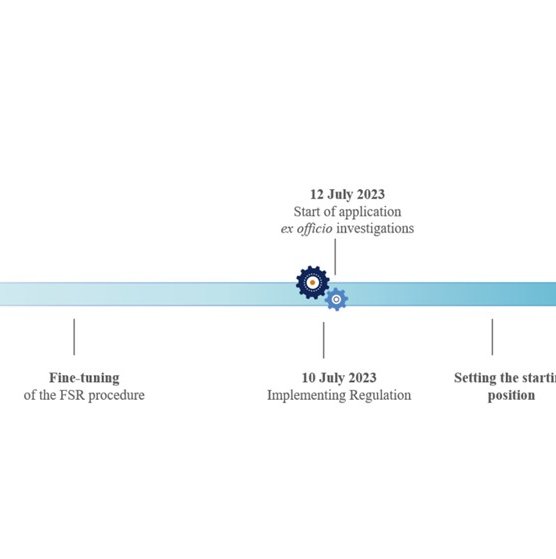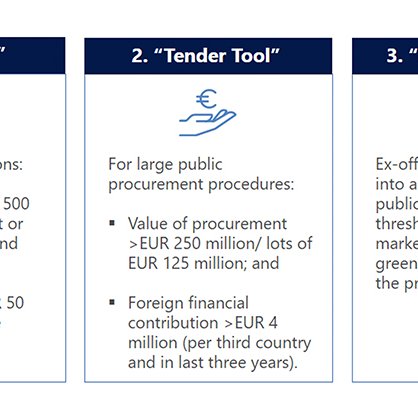As mentioned in our previous blog, the regulatory framework in which companies need to operate is becoming increasingly complex – and at an unprecedented pace. Besides the FSR, several other new instruments have started to apply in 2023 such as the Digital Markets Act and FDI Screening in the Benelux.

Refreshing the memory: what is the Foreign Subsidies Regulation?
The FSR introduces a tool for the European Commission to review and address distortions caused by foreign subsidies and consists of three pillars. The Commission will be able to assess potential distortions by foreign financial contributions either on its own initiative (ex officio) or following a mandatory notification by companies (see figure below). This new regulation is aimed at creating a level playing field in the EU, where European companies were already limited in receiving subsidies from EU governments pursuant to the state aid prohibition. However, compared to the EU state aid prohibition, the FSR has a much broader scope, focusing not just on aid from non-EU governments but also introducing filing obligations based on foreign financial contributions (FFC). The concept of FFC is extremely broad.

Since 12 July 2023, the Commission has had the power to conduct an ex officio investigation. Recent reporting has pointed towards the EU wind industry as a potential first candidate for an ex officio investigation under the FSR. The Commission is considering using its new tool to address the concerns raised by the EU wind industry. In her State of the Union speech, President von der Leyen already stressed the importance of this industry, but also acknowledged the challenges it is currently facing. Chinese wind turbine suppliers are increasingly winning contracts in the EU through aggressive pricing tactics, in a sector where auctions are largely based on price. An ex officio investigation would enable the Commission to assess whether these suppliers benefit from potentially distortive foreign subsidies that allow them to adopt such a pricing strategy.
Run-up to the application of the FSR
The FSR entered into force on 12 January 2023. Soon after, on 6 February 2023, the Commission published the draft Implementing Regulation laying down the procedures for notifications of concentrations and public procurement bids. The draft document revealed that the FSR – although the initiative for such a tool was itself well received by the industry – would result in a highly disproportionate administrative burden on companies operating within the EU. The overwhelmingly negative reception in the industry and by stakeholders did not fall on deaf ears at the Commission. Public statements during this period showed that the Commission was committed to ensuring that the actual use of the instrument will remain fair, concentrated on potentially major distortions, and reducing red tape and reporting obligations to a minimum (see, e.g., speech by Vestager and, more generally, speech by President von der Leyen expressing a commitment to simplify reporting requirements and reduce them by 25%).
Simplifying reporting requirements is not only in the interest of companies. It should also promote efficient handling by the Commission of individual cases, especially where those cases are unlikely to lead to any (major) distortions. An efficient process is key, and the Commission is committed to keeping the impact of the FSR notification process on the transaction or tender process to a minimum.
Alleviating administrative burden
On 10 July 2023, the final version of the Implementing Regulation was published. The promised simplifications in the final version consisted in essence of an increase in the reporting thresholds, thereby excluding certain types of FFCs. Detailed information needs to be provided on financial contributions that are considered most likely to be distortive and a more aggregate overview is requested on other financial contributions, limited to those exceeding certain thresholds and not falling under one of the exceptions from reporting. These exceptions include financial contributions most criticised by stakeholders, namely financial contributions in the form of the supply/purchase of goods/services at market terms, financial contributions to the target company, deferrals of payment of taxes and tax reliefs for avoidance of double taxation. For private equity firms, the reporting obligation is limited (under certain conditions) to the acquiring fund.
The simplification and reduction of the collection and provision of detailed information is of course commendable. However, companies should be aware that in order to determine whether a transaction or a company’s participation in a public tender should be notified under the FSR, i.e., whether the notification threshold has been exceeded, all FFCs must be included. FFCs that are excluded from the reporting obligations are not excluded from the calculation of the notification threshold. Consequently, companies are still obliged to (i) first collect all the necessary information (although such information is often difficult to find and will require a manual exercise), (ii) assess which contributions need to be reported, and (iii) find a way to track future FFCs.
Ensuring an efficient process
It became clear early on that the Commission will have limited resources at its disposal for the application of the FSR. Additional staff (well over 100 extra people) were requested earlier this year, but it is not clear to what extent the need for additional resources will be met. The combination of multiple legislative initiatives and new emerging priorities have “put an enormous strain on the resources of the EU administration”, requiring 600 more posts, the Commission stated in its mid-term budget revision in June 2023.
In a not unrelated move, the Commission published a tender in early July in search of external expertise to help on two fronts: the collection of market intelligence and support in the context of individual enforcement cases, including information-gathering and carrying out analyses.
During a Commission webcast on 10 October, Head of Unit for the FSR Eddy De Smijter further clarified that the DG Comp will have a team dedicated exclusively to enforcing the FSR. The team will be assisted by additional colleagues from the Merger control and State aid unit, either through secondment or by requesting advice in case of specific questions requiring sectoral expertise. The team will soon have two national experts as well, and possibly a few more at a later date.
Setting the starting position
As of 12 October, companies meeting the thresholds are obliged to notify their deal or participation in a public tender. The starting position of the Commission will be one of prioritisation, thereby balancing (a) the need to use its limited resources effectively, (b) its commitment to make the notification process 'work in the leanest way' for companies and (c) its reluctance to take a lenient stance towards companies’ notification obligations early on in the application of the FSR. By way of illustration:
(a) Limited resources means that with the resources reserved for its ex officio powers, the Commission will need to 'pick its battles'. One potential battle the Commission is unwilling to engage in is the one between football clubs regarding what is called 'financial doping', where capital injections into European football clubs by foreign countries are said to distort competition. Several European clubs saw the FSR as a new weapon to attack and stop these capital injections. However, EU officials recently stated that the football sector is currently not a priority for the Commission. This makes sense, since the Commission consistently expressed that its focus would be directed towards distortions created by Chinese subsidies.
(b) The Commission’s priority lies with the pre-notification discussions currently being held with companies that will need to notify. The Commission encourages companies to engage in pre-notification contacts, which are aimed at discussing the information that needs to be included in the notification. According to the Implementing Regulation, such contacts can be “extremely valuable” in determining (and possibly even reducing) the amount of information required. On 10 July 2023, 17 pre-notification discussions were held with the Commission. One potential transaction that may be notified is the Tapestry-Capri transaction, in which Tapestry global house of brands, established in the US and NYSE listed, intends to acquire Capri, a NYSE-listed global luxury fashion group. According to the proxy statement filed with the US SEC, the proposed merger will be subject to approval by the Commission under the FSR.
(c) That being said, even though the Implementing Regulation provides for the possibility of reducing the information required through a waiver request, EU officials has conveyed on several public speaking occasions the message that waivers will not easily be granted. This is in order not to set precedents that will appear too lenient once the Commission has gained experience in determining which information is not necessary for the assessment of the case or not reasonably available to companies.
Conclusion
The actual scope of the FSR obligations remains uncertain, and the concrete form of the FSR is (and will be) evolving bit by bit. This blog will track and provide an overview of the most important developments shaping the application of the FSR.